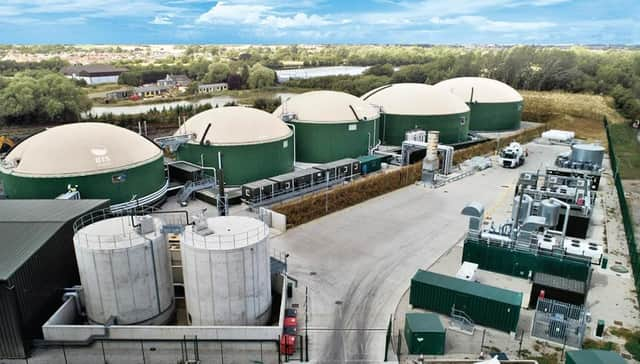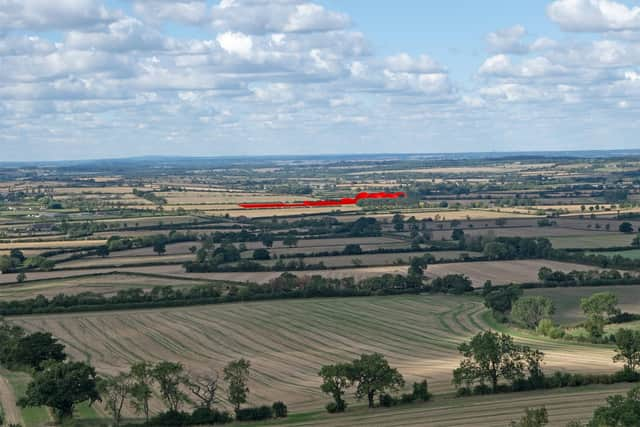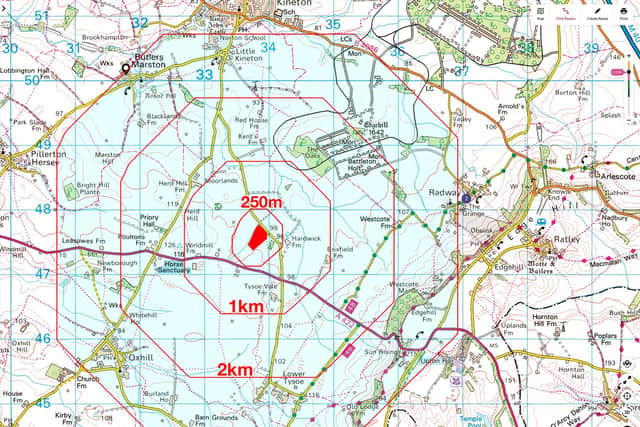Residents in villages north of Banbury are fighting back against plans for a huge biodigester in the countryside


They are objecting to the ‘monstrous’ plan, submitted to Stratford-on-Avon district council by Acorn Bioenergy, claiming that the industrial composter - one of the largest in the UK - will be a blight on land close to the Cotswold Area of Outstanding Natural Beauty (AONB) and site of historical importance.
And given that it would be positioned above ‘the largest munitions base in western Europe’ at MOD Kineton, one resident from Horton even raised fears of a 'catastrophe' when she quizzed Acorn staff at a recent public exhibition of the plan.
Advertisement
Hide AdAdvertisement
Hide Ad"I asked them about the risk of an explosion triggering an event at MOD Kineton. I asked whether they thought it was a good idea to put a digester in relatively close proximity to what has been described as ‘the largest munitions base in Western Europe’,” she said.


“They said ‘they weren’t anticipating an explosion at the digester plant’, and ‘digesters don’t blow up’.
“I pointed out that they can and had blown up and gave examples and they seemed surprised and had no response. One said they had tried to contact the MOD to find out exactly what munitions were kept on site but had been unable to get a response.
“It’s concerning that Acorn seem ill informed about a crucial issue of local and potentially national security. Were there to be an explosion which then caused a large scale incident at MOD Kineton, the fallout could be catastrophic in terms of loss of life, contamination of the environment, and presumably the defensive capability of the army.”
Advertisement
Hide AdAdvertisement
Hide AdThe MOD refused to confirm or deny whether nuclear weapons were store in the vast underground bunkers at Kineton. An MOD spokesperson said: “DM Kineton is a government munitions storage site which operates to the highest safety and security standards. It is longstanding UK and NATO policy to neither confirm nor deny the presence of nuclear weapons at a given location.”


Harry Graham of Acorn Bioenergy told the Banbury Guardian: "We are aware of the Kineton munitions base. We are in discussions with the MOD regarding the proposals. The plant will not pose any risk to MOD Kineton.
“The plant will have numerous economic and environmental benefits. It will produce enough biomethane, a green gas, to heat 7,000 homes and provide fuel for 270 HGVs, resulting in a yearly saving of 26,400 tonnes of CO2 equivalent, which is comparable to taking 17,000 cars off the road or planting one million trees.
"This will also contribute to securing the UK’s energy supply and help over the medium to long term to bring down energy bills. The plant will also produce digestate, a natural fertiliser which is much better for farms than mineral fertilisers, along with CO2, which is currently in short supply due to closure of major CO2 plants in the UK.
Advertisement
Hide AdAdvertisement
Hide Ad“The plant will provide local employment opportunities as well as benefitting farmers by providing them with a guaranteed income for their break crops and agricultural waste.”


The process would mean lorries transporting the gas produced by road to Banbury meaning considerable traffic consequences for the roads.
Residents from miles around say the plant would be enormous and its silos, at 16.5m high, the height of four double decker buses.
They say the industrial composter would be one of the largest in the UK on land close to the Cotswold Area of Outstanding Natural Beauty (AONB).
Advertisement
Hide AdAdvertisement
Hide AdDavid Roache, chair of Tysoe Parish Council, said the application - one of 15 across the country - was ‘entirely opportunistic and wholly inappropriate for this rural setting’.
He added: "If approved it would be a blight on the landscape and wreck arguably the finest views in Warwickshire from the AONB across the Vale of the Red Horse.
"The disruption, pollution and danger caused by the huge volume of heavy traffic into and out from the plant would be hugely damaging to the local community and environment.
"It is estimated there could be 15,000 extra traffic movements per year - around 100 per day (one every four minutes) at peak harvest times, including HGVs, tankers and industrial sized tractors with trailers, choking the rural road network.
Advertisement
Hide AdAdvertisement
Hide Ad“As the local heavy clay soils are unfavourable for growing maize and rye, these crops would need to be imported from further afield, creating additional traffic impacts.
“It would also require farms that currently produce food to be used for fuel, during a cost-of-living crisis and at a time of food scarcity.
"Why Acorn have chosen this site is a mystery. The product to feed the digester will have to be trucked in from farms beyond the close vicinity of the plant and the gas it produces will have to be transported by road to Banbury.”
Stop Hardwick Energy campaigners said: “Anaerobic digestion is ceasing to be seen as a viable way forward as an energy resource and reducer of greenhouse gases. Biomethane is not zero-carbon like wind or solar power.”
Advertisement
Hide AdAdvertisement
Hide Ad“Acorn, which has no track record in this field, says the digester would produce enough gas to heat 8,000 homes, though no homes in the vicinity of the proposed site are connected to gas," Mr Roache said.
The plant would be will be adjacent to the historic site of the Battle at Edgehill and the medieval settlement at Hardwick where artefacts dating back to 4,000 BC have been uncovered in the surrounding fields.
Tysoe residents said they were bitterly disappointed their local MP, Nadhim Zahawi - a Tysoe resident – has refused to get involved or support residents.
Residents have until Tuesday, November 22 to register objections to Stratford upon Avon District Council planning department. Stop Hardwick Energy has produced a website: https://stophardwickenergy.org/ which explains the proposal.
Stratford upon Avon District Council has until January 3, 2023 to decide on the proposal.